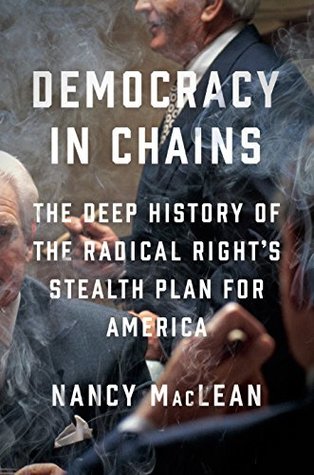More on this book
Community
Kindle Notes & Highlights
Read between
January 24 - March 19, 2022
Yet “Pinochet’s sinister constitution,” as the acclaimed refugee author Ariel Dorfman has called it, by design “mak[es] urgently needed reforms especially difficult to carry out.”43
Admitting that they lack the “social and political freedom” of other countries, he stresses what matters to him: “the greatest economic freedom” and “thus some of the greatest opportunities.” For whom, he does not specify.45
What was needed was a way to amend the Constitution so that public officials would be legally constrained from offering new social programs to the public or engaging in regulation on their behalf even when vast constituencies were demanding them.
Socialism, as the Mont Pelerin Society members defined the term, was synonymous with any effort by citizens to get their government to act in ways that either cost money to support anything other than police and military functions or encroached on private property rights. By that definition, socialism was indeed alive and well in the 1990s.
“Over half of congressional offices, from both sides of the political aisle, send staff to Buchanan Center events,” her fund-raising letter bragged. If that was not enough, “more than one-third of the federal judiciary have participated” in GMU programs that taught them to apply free-market economics in judging legal cases.33
And ordinary Web surfers, to say nothing of IRS employees, did not need to know that the Buchanan Center had been tutoring top legislative staff in such areas as strategies for privatizing Social Security and Medicare, “downsizing government,” and promoting unlimited campaign spending as a form of free speech.43
It was pushing out radical right laws ready to bring to the floor in every state through the American Legislative Exchange Council (ALEC).
Cowen foresees that “we will cut Medicaid for the poor.” Also, “the fiscal shortfall will come out of real wages as various cost burdens are shifted to workers” from employers and a government that does less.
He told one audience that the nation’s school lunch program left poor children with “a full stomach—and an empty soul.”18
“a major device used by organized interest groups to redistribute wealth to themselves.”21
What happened in Flint was not a natural disaster. Nor a case of governmental incompetence. What happened there was directly attributable to the prodding of the Mackinac Center, one of the first Koch-funded—and in this case, Koch-staffed—state-level “think and do” tanks that now exist in all fifty states and are affiliated with the State Policy Network (SPN), also Koch-concocted, to coordinate efforts to prevent state governments from responding to the demands of the “takers.”24
What makes the U.S. system “exceptional,” sadly, is the number of built-in vetoes to constrain the majority.70
Quite the contrary: the interpretation of the Constitution the cadre seeks to impose would give federal courts vast new powers to strike down measures desired by voters and passed by their duly elected representatives at all levels—and would require greatly expanded police powers to control the resultant popular anger.
the George Mason School of Law, now aptly named after Antonin Scalia, are urging the court to fire it by going back to its pre-1937 jurisprudence, when the justices routinely struck down government action to advance popular economic security or social justice goals.82
“from achieving an unimaginable goal in a country that sees itself as a beacon of democracy: a veto-proof supermajority operating without majority support.”92
The libertarian cause, from the time it first attracted wider support during the southern schools crisis, was never really about freedom as most people would define it. It was about the promotion of crippling division among the people so as to end any interference with what those who held vast power over others believed should be their prerogatives.
the liberty to concentrate vast wealth, so as to deny elementary fairness and freedom to the many.


